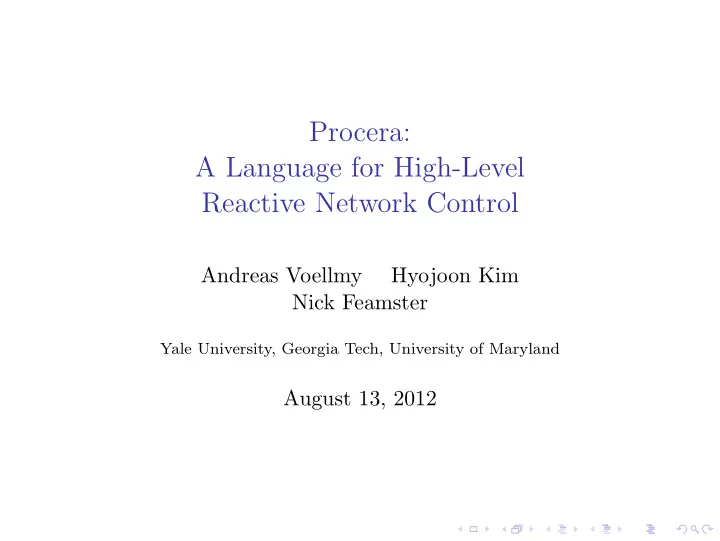

Procera: A Language for High-Level Reactive Network Control Andreas Voellmy Hyojoon Kim Nick Feamster Yale University, Georgia Tech, University of Maryland August 13, 2012
Static & Dynamic Network Policies Network operators want to implement their high-level network policies. Static policies; constrain flow based on flow tuple and state. ◮ Superusers can access the network. ◮ Critical flows should have minimum bandwidth guaranteed. ◮ Guests can access the network daily between 9am and 5pm. Dynamic policies; involve describing state change: ◮ Only authenticated devices can access the network and device authentications expire after 60 minutes. ◮ If a user’s 5 day average exceeds the limit, turn off their access, permanently.
Two Approaches Available Today General-purpose programming: ◮ Very expressive. ◮ Many details to program ◮ Easy to mix up code implementing high-level concepts with low-level code. Specialized policy language, e.g. Flow Management Language (FML) ◮ Easy to use. ◮ Limited to static policies.
Today’s Approaches: FML in Detail E.g. define and allow superusers: allow(Us,Hs,As,Ut,Ht,At,Prot,Req) <- superuser(Us). superuser(todd). superuser(michelle). FML policy is static : it determines a function from states to flow constraints, but cannot specify what the states are or how they should change.
Procera: High-Level Reactive Network Control Declarative language that allows users to define what the states are and how the system state changes in response to events. Key elements: 1. Primitive events 2. Constructs for programming dynamic state; these maintain state incrementally in reaction to events. 3. Composition operators 4. Constructs that collect incremental changes into values such as sets, bags, and dictionaries. 5. Policy function expressed as a function of state and flow tuple and outputting flow constraints.
1. Primitive Events The collection of primitive event streams is customizable. For a sample application we have: ◮ authEvents : authentication events consist of (device, user) pairs. ◮ usageEvents : usage events consist of (device, usage) pairs. ◮ capSetEvents : cap settings consist of (device, usage) pairs. ◮ adminResetEvents : admin resets consist of device ids.
2. Incremental State Programming 60 second sliding window: since 60 Input and Output is incremental, e.g.: ◮ Input ◮ at time 0: insert a ◮ Output: ◮ at time 0: insert a
2. Incremental State Programming 60 second sliding window: since 60 Input and Output is incremental, e.g.: ◮ Input ◮ at time 0: insert a ◮ at time 30: insert b ◮ Output: ◮ at time 0: insert a ◮ at time 30: insert b
2. Incremental State Programming 60 second sliding window: since 60 Input and Output is incremental, e.g.: ◮ Input ◮ at time 0: insert a ◮ at time 30: insert b ◮ at time 50: insert c ◮ Output: ◮ at time 0: insert a ◮ at time 30: insert b ◮ at time 50: insert c
2. Incremental State Programming 60 second sliding window: since 60 Input and Output is incremental, e.g.: ◮ Input ◮ at time 0: insert a ◮ at time 30: insert b ◮ at time 50: insert c ◮ Output: ◮ at time 0: insert a ◮ at time 30: insert b ◮ at time 50: insert c ◮ at time 60: delete a
2. Incremental State Programming 60 second sliding window: since 60 Input and Output is incremental, e.g.: ◮ Input ◮ at time 0: insert a ◮ at time 30: insert b ◮ at time 50: insert c ◮ at time 70: insert d ◮ Output: ◮ at time 0: insert a ◮ at time 30: insert b ◮ at time 50: insert c ◮ at time 60: delete a ◮ at time 70: insert d
2. Incremental State Programming 60 second sliding window: since 60 Input and Output is incremental, e.g.: ◮ Input ◮ at time 0: insert a ◮ at time 30: insert b ◮ at time 50: insert c ◮ at time 70: insert d ◮ Output: ◮ at time 0: insert a ◮ at time 30: insert b ◮ at time 50: insert c ◮ at time 60: delete a ◮ at time 70: insert d ◮ at time 90: delete b
2. Incremental State Programming, Continued Further incremental state operators: ◮ Reset on Clock: resetWindow clockFun ◮ Limit by count: limitBy attr count ◮ Filtering: select pred ◮ Projecting: project f ◮ Grouping: groupWith op ◮ Joining: join , joinOn attr1 attr2
3. Composition Operators Operations can be composed, e.g. since ( days 5) > > limitBy attr 10 >
4. Accumulate Incremental State Operators to collect incremental state signal into a data structure: ◮ collectSequence ◮ collectBag ◮ collectSet ◮ collectTable
5. Policy Functions Policy function implemented as a function that references the state and outputs a constraint , e.g.: policy overSet pkt = if member ( etherSrc pkt ) overSet then Deny else Allow
Putting it all Together Deny any devices whose five day usage exceeds 1000. usageEvents > insertEach > > > since ( days 5) > > > groupWith sum > > > > > select ( λ ( dev , usage ) → usage > 1000) > project fst > > > > > collectSet > > > pure policy
Implementation Language designed to support efficient evaluation: ◮ Eliminate need to poll policy by accurately tracking the maximum amount of time until the state changes. ◮ Update state incrementally based on events and policy definition. ◮ Old events are deleted automatically when no state refers to the event anymore.
Next Steps ◮ Implement network controller; must be in implemented in host language that Procera is embedded in. ◮ Provide richer constraints, e.g. allow and encrypt, allow but avoid switch A, etc. ◮ Address fault tolerance: automated support for persisting controller state. ◮ Optimize incremental change algorithms.
Conclusions ◮ Procera is a language for writing dynamic network policies. ◮ Keeps flow constraints (as in FML) but adds ability to specify state and state changes. ◮ Implementation takes care of details of tracking policy change correctly and efficiently. Questions? andreas.voellmy@yale.edu
Recommend
More recommend